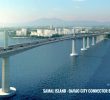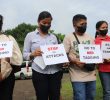CAGAYAN DE ORO CITY, Philippines – The Philippines is on its way to ratifying an international treaty that would prohibit the shipment of hazardous wastes, including obsolete ships and electronic wastes, from developed countries to poor nations, an official of the Department of Environment and Natural Resources (DENR) said Wednesday, February 26.
“We are moving towards ratifying the Basel Ban Amendment (BBA). I have to double-check, but I think that’s our direction,” DENR Undersecretary Juan Miguel Cuna said during a press conference of the 3rd Philippine Environmental Summit at the Grand Caprice Restaurant this city.
Cuna, who heads DENR’s policy, planning, and international affairs, shared though that one of the concerns discussed by the government agency’s Environmental Management Bureau is the effect of the amendment to the entities that are involved in the processing of wastes products.
“It took us some time because we have a recycling industry,” he said, in reference to the BBA ratification, the task of which falls to the Senate.
The amendment, once enforced by countries that are signatories to the Basel Convention, will ensure that developing nations like the Philippines do not become convenient dumping site for trash, even those intended for recycling.
According to the United Nations Environment Programme, the Basel Convention of trans-boundary movements of hazardous wastes and their disposal was adopted on March 22, 1989 in response to public outcry following the discovery that Africa and other developing countries have become a dumping ground of toxic wastes imported from abroad.
Article 9 of the Basel Convention states that “in case of a trans-boundary movement of hazardous wastes or other wastes deemed to be illegal traffic as the result of conduct on the part of the exporter or generator, the State of export shall ensure that the wastes in question are taken back by the exporter or the generator or, if necessary, by itself into the State of export.”
However, the DENR could not just “come up with a policy that will affect an entire sector,” Cuna said, adding that the agency has to find out first how many people are employed in this sector and who will be affected once the amendment is ratified.
Protection vs. waste trafficking
Environmental groups such as the EcoWaste Coalition and Greenpeace Philippines have been advocating for the BBA ratification.
The amendment prohibits the export of hazardous wastes for all reasons, including recycling, from rich countries belonging to the Organization of Economic Cooperation and Development, European Union, and Liechtenstein to developing countries like the Philippines.
“Ratifying the Basel Ban Amendment and further prohibiting the export of all wastes to the Philippines will be our best legal protection against waste trafficking,” said Aileen Lucero, EcoWaste Coalition national coordinator, in a recent statement.
Greenpeace, meanwhile, has been pushing for the ratification of the amendment so the country can ban all shipments of hazardous waste from developed to developing countries, even for recycling purposes.
The ratification will also promote clean production, stop toxic technologies, and prevent governments and companies from circumventing the recycling loophole in the Basel Convention, Greenpeace added. (davaotoday.com)










